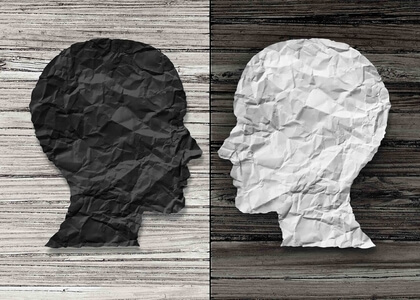
Coming to terms with your own psychological landscape is never easy. Any deviation from what is considered “normal” may cause distress and doubt. We always want to know that we’re not alone in the way we think, perceive, and feel. That’s why less common conditions are additionally confusing because there are very few peers to whom we can turn to for advice or guidance. The best way to combat mental stigmas is to shine a light on them and understand their respective patterns as best we can.
Social Anxiety Disorder
WHAT IT IS
When confronted with a group interaction scenario, most people behave differently than when they are alone. You may become more chatty, self-aware, or even shy. But Social Anxiety Disorder is more than mere shyness; it is a debilitating condition that causes one to fear judgment or rejection to the point of distraction. Your heart rate may increase, you might experience flop sweat, and all of these triggers exacerbate your discomfort with the immediate social situation now facing you.
HOW TO COPE
Therapy is an essential first step in tackling Social Anxiety Disorder, simply because it allows (in fact encourages) the person affected to externalize their feelings to another social being (namely the therapist). While a one-on-one interaction isn’t quite the same as a group dynamic, it’s an important start. Through these initial conversations, your therapist can assess the degree to which the condition hinders your ability to interact with others on a daily basis, and then fashion a diagnosis accordingly. Some people may require medication while others can turn to such methods as meditation and yoga to deal with their particular social anxiety.
Fregoli Syndrome (aka The Delusion of Doubles)
WHAT IT IS
An individual suffering from Fregoli Syndrome misperceives several different people to be one single person assuming many different forms. The affliction is one of paranoia, in that these shape-shifting “others” are all out to persecute you. While the main source of this misperception involves faces, Fregoli sufferers might also disassociate places, household items, and specific memories. Their brains process an image or idea by equating it to a thought more recognizable to them. For example, if a person with Fregoli Syndrome sees a new face, he can’t immediately process the visual stimulus. Instead, he conflates this face with a memory of someone in his past and thinks that this new version of the face is a disguise.
HOW TO COPE
Fregoli is thought to be caused by a lesion on the brain. The condition’s specific peculiarities require a careful diagnosis from a medical professional, who may recommend antipsychotic drugs to treat the syndrome.
Trichotillomania (aka Hair Pulling)
WHAT IT IS
When you respond to stress by pulling out your own hair, that’s a condition known as Trichotillomania. It often revolves around eyebrows, eyelashes, facial hair, or follicles around the perimeter of the scalp. Those affected experience a minor sense of relief when they pull these hairs from their body, but the need to continue their behavior causes additional anxiety and can become a more destructive pattern of self-mutilation. If excessive hair pulling persists, it can cause skin damage and baldness, which can, in turn, add to the individual’s stress levels and trigger more episodes of Trichotillomania.
HOW TO COPE
The best way to combat this disorder is through Habit Reversal Training. In order to cease an unwanted series of mannerisms, you must replace them with activities that are less harmful. For example, your therapist may help you identify when your urges strike and train you to substitute hair-pulling with snapping your fingers. You’re still activating your fingers, but the new behavior isn’t hurtful.
Dissociative Identity Disorder
WHAT IT IS
We all have different ways of dealing with traumatic episodes. Some people are so unable to process the nature of a particular event that they detach themselves from their daily existence to the point where they experience the world from the vantage points of more than one persona. This is called Dissociative Identity Disorder. You may construct an entirely different reality to pretend that the event in question never happened. When you live in this state of denial for long enough, it can create gaps in your memories, which is known as Dissociative Amnesia. The condition can get so intense that you develop an entirely different personality (commonly called Multiple Personality Disorder).
HOW TO COPE
Psychotherapy is key to dealing with Dissociative Identity Disorder. You must come to terms with the nature of the trauma from which you are shielding yourself if you want to reconcile your identity with your daily reality. The treatment process may also involve Eye Movement Desensitization and Reprocessing (EMDR). This entails your therapist moving his or her hand back and forth like a pendulum and asking you to focus your eyes as it moves. You will simultaneously discuss your repressed feelings and try to come to terms with them in the here and now, all the while focusing on the reality of what your eyes are seeing.
Obsessive Compulsive Disorder
WHAT IT IS
The tendency to indulge in needlessly repetitive behavior is called Obsessive Compulsive Disorder (OCD). This may take the form of germaphobia, resulting in prolonged cleansing rituals that damage your skin and consume your time.
HOW TO COPE
As with any psychological affliction, you must get an accurate diagnosis before embarking on a remedy. Your therapist may prescribe a Serotonin Reuptake Inhibitor (SRI) to break the cycle of your obsessive behavior, but these meds should only be taken in connection with ongoing medical observation.
With all of the above conditions, it’s best to seek the recommendations of a trained professional. They can listen, learn, and help you explore your options to journey toward a more satisfying life.






